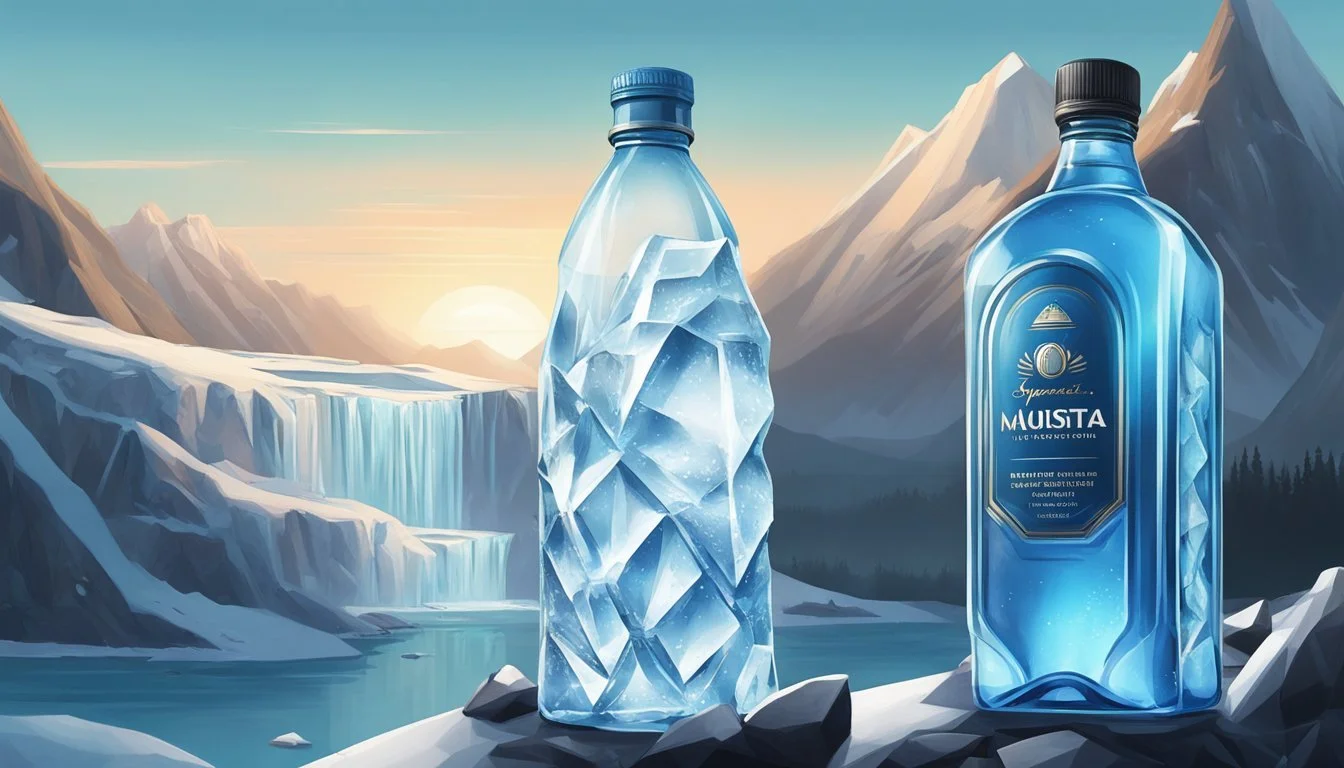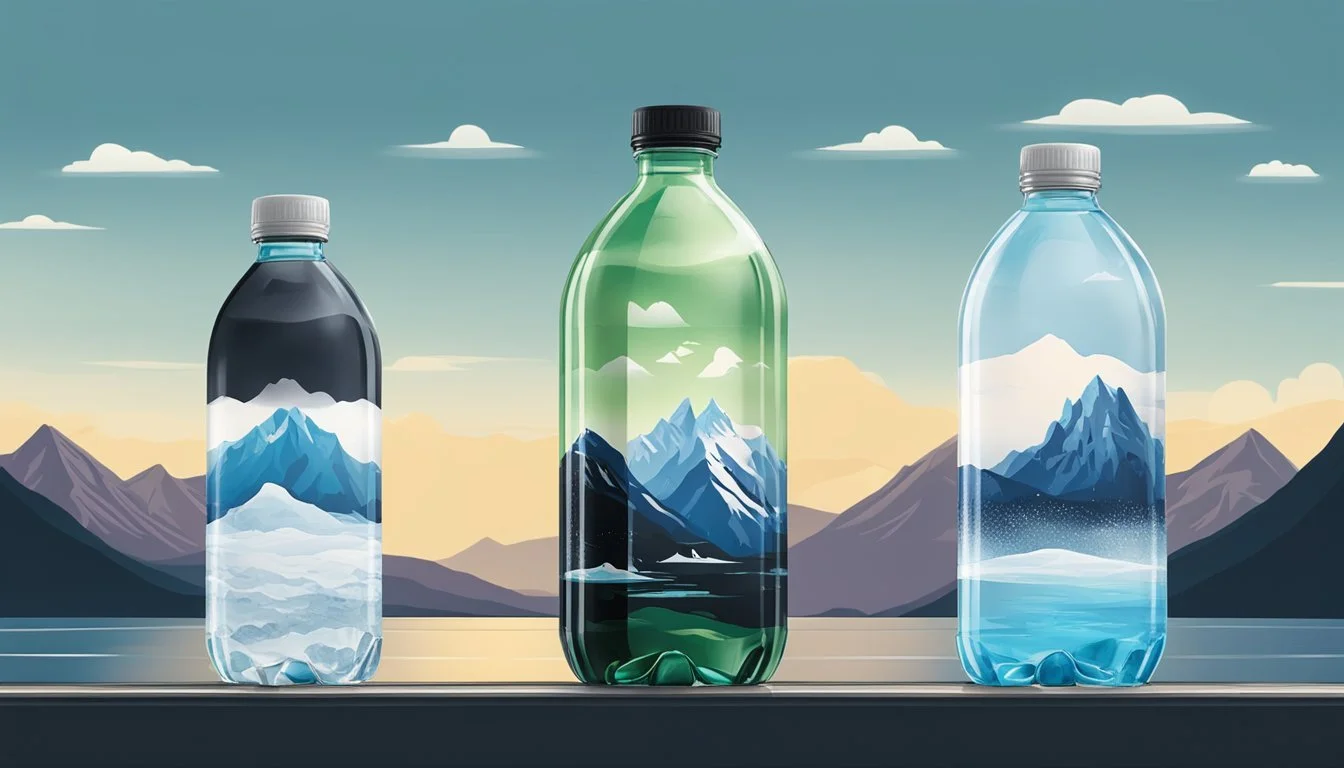Ice Mountain vs. Blk
Which Bottled Water is Better? A Detailed Comparison
The bottled water market is vast and varied, but two names that often spark curiosity are Ice Mountain and Blk. Each brand brings unique qualities to the table, catering to different consumer preferences. Understanding these differences can help you choose the bottled water that suits your taste and lifestyle.
Ice Mountain is renowned for its crisp, clean taste, sourced from natural springs. It offers a refreshing hydration experience that's hard to beat. On the other hand, Blk water stands out for its distinct black color, derived from the addition of fulvic minerals. This not only gives it a unique appearance but also claims to offer various health benefits.
When comparing Ice Mountain and Blk, it boils down to preference: if you value a traditional, refreshing spring water, Ice Mountain is your go-to, but if you're intrigued by unique flavors and potential health benefits, Blk might be worth a try. Dive into the specifics of these two brands to find out which one aligns best with your needs and why they are worth considering in the ever-evolving bottled water industry.
Understanding Bottled Water
Bottled water comes in various forms and originates from different sources, each impacting its quality and health benefits. Details such as water source, purification methods, and mineral content are critical for consumers.
Source and Origin of Water Brands
The origin of bottled water plays a significant role in its quality. Ice Mountain is often sourced from natural springs, providing naturally occurring minerals and a fresh taste.
Blk water, a unique brand, gets its distinctive color and mineral content from fulvic acid extracted from ancient deposits. Natural spring water like Ice Mountain's typically contains a mix of essential minerals, while Blk’s fulvic-enhanced water offers a different mineral profile.
Health and Hydration Factors
The health benefits of bottled water depend on its mineral content and purity. Ice Mountain contains naturally occurring minerals like calcium and magnesium, which contribute to overall health and hydration.
Blk water, with its fulvic acid content, is marketed for its supposed health benefits, including improving nutrient absorption. Both brands ensure their water is free from contaminants, meeting Environmental Protection Agency (EPA) standards for bottled water. These differences influence consumer choices based on health needs and preferences.
Key Elements of Water Quality
Water quality is determined by factors such as filtration, purity, and mineral content. Ice Mountain employs a multi-step filtration process to ensure the removal of impurities, maintaining the water's natural balance of minerals.
Blk water undergoes purification to add fulvic acid while eliminating contaminants. Both brands highlight the purity of their products, but their differing mineral compositions appeal to varied consumer tastes. Recycling and sustainability are also critical, with Ice Mountain using plastic bottles and Blk offering more eco-friendly packaging options.
Comparative Analysis of Ice Mountain and Blk
This section explores the taste, mineral content, bottling processes, and consumer perception of Ice Mountain and Blk bottled waters. It highlights key aspects to help readers make an informed decision on their preferred bottled water brand.
Taste and Flavor Profile
Ice Mountain offers a clean and crisp taste, attributed to its multi-step filtration process. This includes removing large particles and impurities, resulting in a pure, refreshing flavor. Consumers often describe the taste as neutral with no overpowering aftertaste.
On the other hand, Blk distinguishes itself with its unique appearance and subtle flavor. Made with fulvic trace minerals, Blk has a slightly earthy taste. This is due to its naturally occurring minerals that give it a distinct, but not unpleasant, profile. Water enthusiasts appreciate both brands for their unique characteristics, but preferences depend largely on individual taste buds.
Mineral Content and Health Benefits
Ice Mountain prides itself on having a balanced mineral content that contributes to its refreshing taste. It contains essential minerals like calcium, magnesium, and sodium which are beneficial for health. The mineral composition supports hydration and offers mild benefits without overwhelming the palate.
Blk water stands out due to its inclusion of fulvic trace minerals. The alkaline nature of Blk, with a pH level typically around 8.0-9.0, is often marketed as giving additional health benefits including improved hydration and detoxification. While Blk’s mineral content is unique, its health benefits are often debated among consumers and experts.
Bottling Processes and Purity
Ice Mountain undergoes a rigorous multi-step filtration process ensuring high purity levels. The steps include initial screening, carbon filtration, and UV treatment which collectively remove PFAS chemicals and other impurities. This meticulous process guarantees that consumers get safe and pure bottled water.
Blk, known for its black color due to fulvic minerals, adopts a process that mixes these naturally occurring minerals into purified water. This process ensures the water's purity while incorporating the health benefits of fulvic minerals. Both brands prioritize water safety but do so through different methodologies, catering to different consumer preferences for purity.
Branding and Consumer Perception
Ice Mountain is perceived as a reliable and traditional brand. Its marketing emphasizes purity and the natural source from which the water is drawn. Consumers trust Ice Mountain for its consistency and the clean taste it regularly delivers.
Blk, however, has a more niche positioning due to its distinctive black color. Often linked with wellness trends, Blk attracts health-conscious consumers intrigued by its novel appearance and potential health benefits. This bold branding sets it apart, appealing particularly to a younger demographic looking for innovative health products.
Each of these sections delves into specific aspects of both brands, helping readers understand the differences and make an informed choice.
Environmental and Health Considerations
Evaluating the environmental and health impacts of Ice Mountain and Blk bottled water involves examining their packaging, water sources, and adherence to safety regulations. Each aspect provides insights into their sustainability and safety for consumers.
Eco-Friendly Packaging and Recycling
Ice Mountain uses 100% plastic bottles, primarily from petrochemicals derived from oil. While these are widely recyclable, the low recycling rates are a significant concern. In contrast, Blk positions itself as a premium brand with packaging that emphasizes aesthetics but often lacks clear recycling instructions.
Boxed Water, a competitor mentioned in sustainability discussions, uses recyclable paper cartons, showcasing a more eco-friendly approach. Both Ice Mountain and Blk need clearer messaging on recycling to improve their environmental footprint. Addressing the material composition and recyclability can greatly enhance their eco-friendly standings.
Water Source Sustainability
Ice Mountain sources its water from natural springs in the Midwest, a practice that raises questions about sustainability. Continuous extraction from these springs can affect local ecosystems, especially during long-term use. The brand is part of Nestlé Waters, which has faced criticism for its water sourcing practices.
Blk, on the other hand, emphasizes the addition of fulvic minerals to purified water. While the source of water isn't as contested, the addition and sourcing of minerals need to consider long-term environmental impacts. Consumers increasingly demand transparency regarding water extraction and its sustainability.
Competitors like Icelandic Glacial highlight the importance of renewable water sources. Brands need to adopt similar practices to ensure sustainable water use.
Regulations and Safety Standards
Both Ice Mountain and Blk adhere to robust FDA and IBWA standards, ensuring the safety of their products. Ice Mountain undergoes thorough filtration to reduce contaminants, meeting stringent regulatory requirements. However, like many in the industry, it faces concerns over microplastic contamination.
Blk's unique selling point is its fulvic mineral content, which must meet various safety standards to ensure consumer health. Both brands emphasize their adherence to safety norms, but increased transparency in testing and results can further assure consumers.
Understanding the regulatory landscape and ensuring compliance helps both brands maintain consumer trust and demonstrate their commitment to health and safety.
Consumer Convenience and Accessibility
When assessing Ice Mountain and Blk bottled water, understanding their availability, market presence, and practical packaging options is essential for consumers.
Availability and Market Presence
Ice Mountain has a robust presence in the Midwest of the United States, where it is commonly available in grocery stores, gas stations, and vending machines. Originating from natural springs in the region, it benefits from strong regional demand.
Blk water, recognized for its distinctive black color due to the inclusion of fulvic minerals, is available nationwide and online. However, it is less frequently found in local convenience stores compared to Ice Mountain.
Large retailers such as Walmart, Target, and online platforms carry both brands, making them accessible despite their differing market focuses. Nestlé Pure Life, Dasani, Aquafina, Essentia, and Evian are other popular bottled water brands often available alongside these options.
Packaging Options and Practicality
Ice Mountain typically offers its water in 100% plastic bottles, emphasizing its convenience for on-the-go consumers. The bottles are lightweight, easy to carry, and widely recyclable, though the actual recycling rates can vary.
Blk bottled water usually comes in plastic bottles but occasionally employs glass packaging for a premium feel. The distinctive black hue of the water, combined with sleek bottle designs, makes it a unique choice, though it may not be as practical for everyday use as Ice Mountain.
While Ice Mountain focuses on convenience with various bottle sizes from small single servings to large multi-liter options, Blk aims to attract consumers seeking novelty and potential health benefits, sometimes at the cost of convenience.
Each brand's packaging strategy caters to different consumer needs, with Ice Mountain leaning towards functionality and Blk towards uniqueness.
Technical Aspects of Bottled Water Production
Bottled water production involves various advanced processes to ensure quality, purity, and transparency. Key focuses are on effective filtration methods and maintaining optimal mineral and electrolyte content.
Filtration and Purification Methods
Advanced filtration and purification techniques play a crucial role in bottled water production. Reverse osmosis is a common method which forces water through a semipermeable membrane to remove contaminants. This process eliminates particles, bacteria, and other impurities effectively.
Filtration processes like the multi-step approach used by Ice Mountain begin with screening large particles, followed by finer filtration stages. Vapor-distilled methods involve heating water to create vapor, then condensing it back into liquid form, which can remove impurities and minerals. This is similar to processes used by brands like Smartwater.
Hydro-7 is another sophisticated seven-stage filtration process used by specific brands. These multiple stages ensure high-quality water by systematically removing contaminants at each level. Such processes can also help in adding back beneficial electrolytes and minerals in controlled amounts, which is important for hydration and taste.
Assessing the Mineral and Electrolyte Content
Mineral and electrolyte content significantly influences the taste and health benefits of bottled water. Electrolytes like sodium, potassium, and magnesium are vital for hydration and proper body functioning. Core Hydration includes an optimal blend of these electrolytes to ensure effective hydration.
Brands may naturally source minerals or add them during purification. For instance, Ice Mountain sources its water from natural springs, ensuring a baseline mineral content. Testing these levels ensures consistency and aligns with the brand's taste profile.
Ensuring balance in mineral content can affect the water's alkalinity and pH levels. This fine-tuning is necessary for maintaining flavor and health benefits, setting apart premium brands from standard bottled waters.
Market Analysis and Brand Comparisons
When evaluating Ice Mountain and Blk bottled waters, the market's competitive landscape and consumer preferences play a crucial role. Brand values, pricing strategies, and the broader industry context provide insight into their positioning.
Industry Leaders and Competitors
Ice Mountain, part of Nestlé Waters, contends with global and regional players like Evian, Poland Spring, and Deer Park. Blk, known for its alkaline, fulvic-enhanced water, targets niche markets. Both must navigate competition from high-quality water brands like Icelandic Glacial and Zephyrhills, as well as eco-friendly options such as Boxed Water and established names like Essentia and Lifewtr. The International Bottled Water Association highlights that market leaders often leverage unique water sources or innovative packaging to attract consumers seeking hydration solutions.
Price Points and Value for Money
Ice Mountain, typically priced moderately, offers significant value by relying on the volume buying power of Nestlé. It uses a multi-step filtration process to ensure purity. By contrast, Blk's premium positioning reflects its unique product attributes, including enhanced mineral content and alkaline pH levels. Consumers viewing high-quality water as an investment in health might find Blk’s higher price justified. Price comparisons reveal Ice Mountain's affordability, appealing to budget-conscious consumers, while Blk attracts those willing to pay for perceived health benefits.
Consumer Trends and Preferences
Recent consumer trends show a shift towards natural water sources and sustainable packaging. Ice Mountain’s widespread availability and moderate pricing make it a staple in many households. Consumers trust familiar brands like Ice Mountain for consistent hydration needs. Blk caters to a more health-conscious demographic, emphasizing unique health benefits and a distinct market position. The growing demand for eco-friendly products challenges both brands to innovate in packaging and sustainability. Consumer preferences increasingly favor transparency in sourcing and production, impacting purchasing decisions across the bottled water market.
Cultural and Social Impact
Examining the cultural and social impacts of Ice Mountain and Blk bottled waters involves understanding the roles of water sommeliers as well as public perception and media influence. Each plays a critical part in shaping consumer opinions and preferences.
The Role of Water Sommeliers
Water sommeliers are experts who specialize in the fine distinctions of bottled water. They evaluate characteristics such as mineral content, pH levels, and taste profiles. Ice Mountain, known for its balanced pH and moderate mineral content including calcium and magnesium, often receives favorable reviews from these connoisseurs.
In contrast, Blk water garners attention for its unique black hue, derived from fulvic minerals. These sommeliers provide insights that educate consumers, promoting a deeper appreciation for the nuances of each brand. Their evaluations help highlight the health benefits and distinctive features, influencing consumer choices and adding credibility to both brands.
Public Perception and Media Influence
Public perception of bottled water often hinges on branding and media portrayal. Ice Mountain, with its image rooted in natural spring water and sustainability initiatives, appeals to environmentally-conscious consumers. Campaigns like "Made For A Better Tomorrow" focus on recycling and community support, boosting its social footprint.
Blk water, with its striking appearance and claims of enhanced mineral content, benefits from social media buzz and celebrity endorsements. Platforms like Twitter amplify its unique selling points, creating a trendy and health-conscious image.
Media portrayal and social media play significant roles in shaping opinions and driving consumer behavior, making both brands prominent in the bottled water market. Each utilizes different strategies to capture and maintain public interest.
Concluding Thoughts
When comparing Ice Mountain and Blk bottled waters, several key factors come into play.
Environmental Footprint:
Ice Mountain sources its water from Midwestern springs, ensuring a local distribution with potentially lower transportation emissions. Blk, known for its distinctive black color due to fulvic minerals, also emphasizes eco-friendly practices but has a broader geographical distribution.
Both brands focus on sustainability, but their approaches differ.
Certifications:
Ice Mountain has various certifications on its side, often related to its spring sources and bottling processes. Blk, being a unique product with added minerals, has specific certifications attesting to the safety and quality of its ingredients.
Consumers looking for certified purity may lean towards Ice Mountain, while those interested in added health benefits might prefer Blk.
Alkaline Water:
Blk water stands out due to its alkaline nature and the added fulvic minerals, which some believe offer enhanced hydration and detoxification. Ice Mountain, while not specifically marketed as alkaline water, prides itself on its refreshing taste and natural spring source.
This distinction makes Blk appealing to health enthusiasts, while Ice Mountain’s straightforward purity appeals to everyday hydration needs.
Reusable Water Bottles:
Both brands encourage the use of reusable water bottles as part of their commitment to reducing single-use plastic waste. Ice Mountain offers initiatives to promote recycling among its consumers, while Blk often highlights its partnerships with environmental organizations.
Bottom Line:
Choosing between Ice Mountain and Blk boils down to personal preferences in taste, health benefits, and environmental concerns. Each brand offers unique advantages catering to different consumer priorities.
More About Ice Mountain
Core Hydration vs Ice Mountain: Which Bottled Water is Better?
Ice Mountain vs Aqua Carpatica: Which Bottled Water is Better?
Ice Mountain vs Cascade Mountain: Which Bottled Water is Better?
Ice Mountain vs Crystal Geyser: Which Bottled Water is Better?
Ice Mountain vs Crystal Lake: Which Bottled Water is Better?
Ice Mountain vs Essence pH10: Which Bottled Water is Better?
Ice Mountain vs Hawaii Volcanic: Which Bottled Water is Better?
Ice Mountain vs Hawaiian Springs: Which Bottled Water is Better?
Ice Mountain vs Icelandic Glacial: Which Bottled Water is Better?
Ice Mountain vs Kirkland Signature: Which Bottled Water is Better?
Ice Mountain vs Liquid Death: Which Bottled Water is Better?
Ice Mountain vs Mountain Valley Spring Water: Which Bottled Water is Better?
Ice Mountain vs Nestle Pure Life: Which Bottled Water is Better?
Ice Mountain vs Poland Spring: Which Bottled Water is Better?
Ice Mountain vs Proud Source: Which Bottled Water is Better?
Ice Mountain vs Purely Sedona: Which Bottled Water is Better?
Ice Mountain vs Richard's Rainwater: Which Bottled Water is Better?
Ice Mountain vs San Pellegrino: Which Bottled Water is Better?
Ice Mountain vs Simple Truth: Which Bottled Water is Better?
Ice Mountain vs Solan de Cabras: Which Bottled Water is Better?
Ice Mountain vs Talking Rain AQA: Which Bottled Water is Better?
Ice Mountain vs Whole Foods 365: Which Bottled Water is Better?
Ice Mountain vs Whole Foods Italian Still Mineral water: Which Bottled Water is Better?








